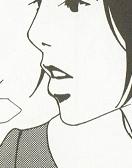Alison Rumfitt: Tell Me I'm WorthlessJohn Darnielle: Devil House.Jessamine Chan: The School for Good MothersSequoia Nagamatsu: How High We Go in the Dark
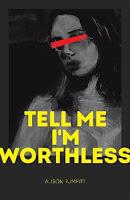 I read Alison Rumfitt's brilliant debut novel Tell Me I'm Worthless again in January this year, this time in conjunction with Shirley Jackson's The Haunting of Hill House (which I had never read before, and it surprised me how queer it was). Tell Me I'm Worthless is also about a haunted house, except this one is not apolitical - its name is Albion, like the mystical founder of England, and it hates violently, especially those who deviate from its narrow conception of humanity (all the while the country it's set in veers towards something horrible, an ominous violence that is frequently hinted at). Jackson writes "No live organism can continue for long to exist sanely under conditions of absolute reality", Rumfitt uses this as a jumping off point - "No live organism can continue to exist compassionately under conditions of absolute fascism." This house turns people who enter it against each other by using their pre-existing prejudices and flaws, except here the horror is visceral, physical and gory. It also prompted me to re-read all of Caitlín R. Kiernan's earlier novels, where the difference between psychosis and supernatural horror constantly blurs to the extent that the difference ceases to matter, since it determines the reality of its protagonists.
I read Alison Rumfitt's brilliant debut novel Tell Me I'm Worthless again in January this year, this time in conjunction with Shirley Jackson's The Haunting of Hill House (which I had never read before, and it surprised me how queer it was). Tell Me I'm Worthless is also about a haunted house, except this one is not apolitical - its name is Albion, like the mystical founder of England, and it hates violently, especially those who deviate from its narrow conception of humanity (all the while the country it's set in veers towards something horrible, an ominous violence that is frequently hinted at). Jackson writes "No live organism can continue for long to exist sanely under conditions of absolute reality", Rumfitt uses this as a jumping off point - "No live organism can continue to exist compassionately under conditions of absolute fascism." This house turns people who enter it against each other by using their pre-existing prejudices and flaws, except here the horror is visceral, physical and gory. It also prompted me to re-read all of Caitlín R. Kiernan's earlier novels, where the difference between psychosis and supernatural horror constantly blurs to the extent that the difference ceases to matter, since it determines the reality of its protagonists. 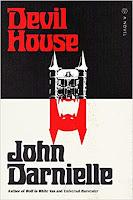 The Mountain Goat's John Darnielle returns for a third novel with Devil House. I liked both of his previous books, Wolf in White Van and Universal Harvester, but with Devil House I felt more keenly what I do when I listen to his records: essentially, every single song contains the seeds for a whole story, and Darnielle has the uncanny ability to convey so much about a person and a relationship in just a few lines (take the doomed relationship in his most popular song, No Children, or the incredible warmth in the community of Color in Your Cheek) His newest novel is about a true crime writer who moves into a house with a long history that includes two murders - and includes the fictional account of the writer's most successful book about a different killing - but rather than focusing on the horror, Darnielle paints all the characters in great detail, especially the wild creativity and artistry (which ends up being completely misunderstood in the panic that follows the killings) of the teenagers who turn Devil House into an art installation while they deal with the prospect of high school ending, of their relationship being transformed inevitably by the end of what holds them together. The murders are almost incidental (and the same holds true for the insert story about a teacher, whose life is drawn vividly, who just ends up going to far when she is attacked in her own home). That gentle care with characters feels like a celebration almost, and like a reminder of what kind of responsibility any storyteller (not just true crime) has.
The Mountain Goat's John Darnielle returns for a third novel with Devil House. I liked both of his previous books, Wolf in White Van and Universal Harvester, but with Devil House I felt more keenly what I do when I listen to his records: essentially, every single song contains the seeds for a whole story, and Darnielle has the uncanny ability to convey so much about a person and a relationship in just a few lines (take the doomed relationship in his most popular song, No Children, or the incredible warmth in the community of Color in Your Cheek) His newest novel is about a true crime writer who moves into a house with a long history that includes two murders - and includes the fictional account of the writer's most successful book about a different killing - but rather than focusing on the horror, Darnielle paints all the characters in great detail, especially the wild creativity and artistry (which ends up being completely misunderstood in the panic that follows the killings) of the teenagers who turn Devil House into an art installation while they deal with the prospect of high school ending, of their relationship being transformed inevitably by the end of what holds them together. The murders are almost incidental (and the same holds true for the insert story about a teacher, whose life is drawn vividly, who just ends up going to far when she is attacked in her own home). That gentle care with characters feels like a celebration almost, and like a reminder of what kind of responsibility any storyteller (not just true crime) has. 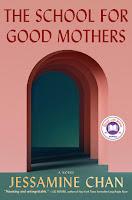 Jessamine Chan tells a claustrophobic, horrifying tale about what happens when obsession with technological control and idealised motherhood combine with a state that runs on surveillance and incarceration. In The School for Good Mothers, Frida, mother to an almost-two-year-old, leaves her daughter at home for two hours after an incredibly stressful day. She gets caught, and then caught up in a "reformed" system that sends negligent mothers to a prison camp to ideologically re-educate them into obedience. Chan brilliantly combines observations about how mothers are already constantly bombarded with assumptions and demands (and control) with a Utopian tale about a surveillance state (technologically armed - the novel features incredibly creepy robot children for the mothers to learn on, and endless amounts of data-collecting gadgets) that cares nothing for the individual that gets caught up in its demands. A very interesting novel to read in conjunction with Maggie Gyllenhaal's adaptation of The Lost Daughter, in which young mother and academic Leda (Jessie Buckley, then Olivia Colman) struggles profoundly with conventional motherhood, with preserving her personhood.
Jessamine Chan tells a claustrophobic, horrifying tale about what happens when obsession with technological control and idealised motherhood combine with a state that runs on surveillance and incarceration. In The School for Good Mothers, Frida, mother to an almost-two-year-old, leaves her daughter at home for two hours after an incredibly stressful day. She gets caught, and then caught up in a "reformed" system that sends negligent mothers to a prison camp to ideologically re-educate them into obedience. Chan brilliantly combines observations about how mothers are already constantly bombarded with assumptions and demands (and control) with a Utopian tale about a surveillance state (technologically armed - the novel features incredibly creepy robot children for the mothers to learn on, and endless amounts of data-collecting gadgets) that cares nothing for the individual that gets caught up in its demands. A very interesting novel to read in conjunction with Maggie Gyllenhaal's adaptation of The Lost Daughter, in which young mother and academic Leda (Jessie Buckley, then Olivia Colman) struggles profoundly with conventional motherhood, with preserving her personhood.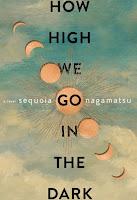 How High We Go in the Dark by Sequoia Nagamatsu is a collection of interconnected short-stories about an end of the world: climate change makes an ancient virus reappear, and it radically transforms society. Sequoia follows characters as they reckon with individual and collective grief and work on ways to help humanity survive - either on Earth, or beyond. There is one story about a scientist working with a pig that evolves to develop speech and a full consciousness, and it made me cry (perfectly timed with a re-emergence of this tweet). Nagamatsu charts the progression of the virus from its discovery through the changed reality of a world reckoning with mass death - what that means for rituals of grieving, how we accompany those who are dying, what it means for family structures - and he then charts the course of humanity through technological leaps and bounds into space, thousands of years in the future.
How High We Go in the Dark by Sequoia Nagamatsu is a collection of interconnected short-stories about an end of the world: climate change makes an ancient virus reappear, and it radically transforms society. Sequoia follows characters as they reckon with individual and collective grief and work on ways to help humanity survive - either on Earth, or beyond. There is one story about a scientist working with a pig that evolves to develop speech and a full consciousness, and it made me cry (perfectly timed with a re-emergence of this tweet). Nagamatsu charts the progression of the virus from its discovery through the changed reality of a world reckoning with mass death - what that means for rituals of grieving, how we accompany those who are dying, what it means for family structures - and he then charts the course of humanity through technological leaps and bounds into space, thousands of years in the future. NY Times: The Battle for the World’s Most Powerful Cyberweapon, January 28, 2022Vox: Why Tamsyn Muir turned her fantasy trilogy into a quartet halfway through, January 27, 2022Elle: My Brush With The Black Manosphere, January 25, 2022Guardian: ‘We had to mimic to everyone to run’: how Tonga’s volcano and tsunami disaster unfolded, January 24, 2022Guardian: ‘The opposite of planning’: how Australia put the economy before health of the nation, January 20, 2022The Monthly: Marshall Law, January 19, 2022NY Times: In Volcano’s Aftermath, an Agonizing Wait for Tonga News, January 17, 2022Autostraddle: “Yellowjackets” Episode 110 Recap: Unsolvable Mysteries, January 17, 2022Vulture: Yellowjackets’ Liv Hewson Fears for the Future of Van and Taissa, January 17, 2022Vulture: The Yellowjackets Showrunners Answer All Our Post-Finale Questions, January 16, 2022Foreign Policy: Climate Change Demands More Air Conditioning, January 16, 2022The Guardian: Tented love: how Senegal created a spectacular new African architecture, January 13, 2022Popular Science: Welcome to invasivorism, the boldest solution to ethical eating yet, December 7, 2021Popula: The Center Held Just Fine, October 15, 2018
